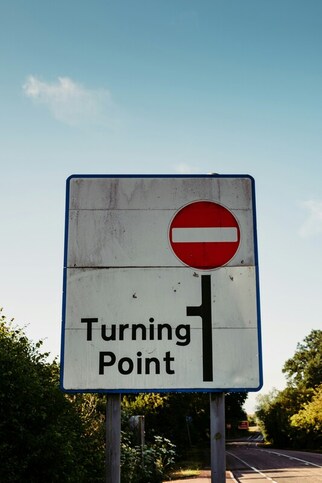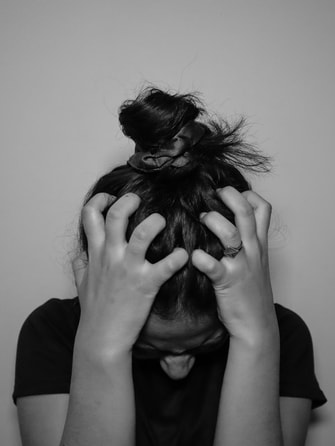 Most of our current problems are solutions our past self came up with when it didn't have more options or resources. Our patterned responses to people, situations, and internal experiences might not be helpful to the person we are today. But those patterns can be traced back to a time in our life when this was the solution (whether from a place of creativity or lack of resources) we came up with considering the context we were in at the time. As we move through life, there will always be signs showing us when our old solutions have become outdated and ineffective. Here's an example from my life. The summer before I turned 15, I started smoking cigarettes. It was a solution for fitting in and belonging in my small, but very close friend group. Over time, this habit became an identity and a way to socialize with people. I dragged this 10 year old habit with me to the U.S. where, almost overnight, it became a real impediment towards who I wanted to be. Smoking was more complicated to maintain in the U.S. than it was in Serbia and as I started paying more attention to my health and lifestyle. Being a smoker was a layer of identity I was fully ready to shed. I quit and never looked back. So next time you feel stuck in a reoccurring problem or a habit that seems hard to ditch, try to have a bit more compassion and respect for these patterns. See if you can understand how and why you developed them in the first place and how they might have been the right solution at a different time in your life. Reflection Questions:
Our mind can often be like a harsh bully, ready to attack when we feel most vulnerable. It can make us feel weak and powerless.
Our mind follows a familiar script it's been given when we were young. It repeats those voices we heard most often, and will keep speaking to us the same way we were spoken to. But we don't have to believe everything it's telling us about us. When that harsh voice pops in and starts becoming loud and obnoxious, we can take a step back and just notice what it's telling us without immediately defending or believing the content of those words. We might even say to ourselves "oh that old story again, I've heard this before." We might ask, "what else is there?"  When our predictable ways of responding to challenges don’t seem aligned with who we want to be, we have the ability to respond differently. When we're caught up in the moment, we don't give ourselves the space and the option to consider a different type of response, but that doesn't mean we are not capable of it. In order to respond differently, we simply need to give ourselves a bit of space and pause (something my client's often hear me say:)). In pause, we have the option to notice what we usually tend to do and then we have the option to decide if we actually want to that this particular time. We give ourselves a choice. Asking ourselves: How would a version of me that I aspire to be respond to this challenge? helps us zoom out of our habitual ways and be intentional in what we do and how we do it. Happy journaling!  In the self-improvement space, it's not unusual to hear people say they want to be the best version of themselves and reach their full potential. But who is that best version of ourselves? Why does it always feels out of reach? What's wrong with this current version? And is this potential everyone demands is so important even reachable? Working to reach our full potential implies it is something we achieve after we take a specific set of steps. It's where we get to after we "work on ourselves." But what exactly are we working towards? Promises, promises... Continuously bettering ourselves can feel meaningful, even superior. It is seductive because it keeps alive promises that supposedly await at the end of this pursuit. Directly or indirectly, it promises a psychological state of serenity, bliss, actualization, wisdom, and an existence of no suffering, no insecurity, no rejection; an existence filled with confidence, fulfillment, success, abundance... It promises transcendence of an ordinary existence. So in order to not settle, or God forbid be an average person, we keep pursuing and seeking and improving and healing. But so frequently these attempts to reach our full potential feel like attempts to escape, rise above, and heal ourselves out of basic human experiences. The reality is... When we embark on the quest of chasing something illusive and nebulous, as it often is the case with becoming the best version of ourselves, it can easily turn into a never ending pursuit that doesn't have a clear definition, hence no clear arrival point. So, I conclude that reaching one's potential simply isn't reachable, it CAN only be a continuous chase. A quest that briefly soothes those feeling lost and confused because it will keep one busy, committed, and exhausted! It may feel like a full time job. A constant analysis of one's deficiencies and limitations. A never ending quest of fixing oneself and trying to heal ourselves out of normal human experiences. It becomes an exhausting chase of a future ideal that can never be completed. And the more we chase it, the more we feel broken, unworthy, and never as happy as we "could" be. Giving up the chase is not a defeat. Giving up on the idea of reaching our full potential may feel like a defeat. But it doesn't have to be if you're open to a different perspective. The chase makes us preoccupied with what we're lacking and with what's wrong with us. It takes us away from wholeness and the aliveness of this moment, which is the only moment we actually have. The chase requires us to pause (or dismiss) the present in order to work for that extraordinary future in which we hope to be better, more actualized, more whole, more healed. A road to fulfillment or burn out? If self-improvement excites you, make you feel more connected to yourself and others, makes you feel alive and fulfilled, brings you a sense of healthy ambition and ultimately adds to your life, keep at it! But if starts feeling exhausting, life consuming, expensive, and dreadful, maybe it's time to take a pause and reevaluate. When empowerment, self-trust, and self-determination become replaced by self-doubt, overthinking, and continued dependence on someone else's input and wisdom, you might be on a road to burn out. This is when it's time to seriously consider whether the pursuit is turning out to be what it promised. We don't need more fixing... I believe that the cure for feeling dissatisfied isn't in fixing ourselves but in understanding who we are and fully letting ourselves be it. It's about embracing ordinary moments, loving what we do have, and trusting our inner guidance. In those moments when I feel like what present is offering me isn't enough, when I feel like I need more to be happy, and I start glorifying what I don't have, thinking that it would fulfill me - I think of my mom. She died 8 years ago from metastatic breast cancer. I know she would love to fully be in this moment as ordinary and simple as it may be. She would love to just sit outside and drink coffee, cook a meal, spend an afternoon with her grandkids, make plans, tend to her vegetable garden, admire the beautiful roses in her yard, talk to me for hours. It's a simple idea (I'm yet to master irl) and constant reminder (at least for me) that embracing these ordinary moments and finding joy and gratitude in every day experiences IS our highest purpose. All the what if's...
Don’t get stuck in forcing solutions that don’t work for you. Even if one way of doing things seemed to be life changing for some people, it doesn’t mean it has to work for you. It either does, or it doesn’t. And if it doesn’t - it’s ok to move on without incessantly questioning yourself and forcing yourself to fit into a solution that's not meant for you.
|
Categories
All
Archives
June 2024
AuthorSladja Redner |
 RSS Feed
RSS Feed